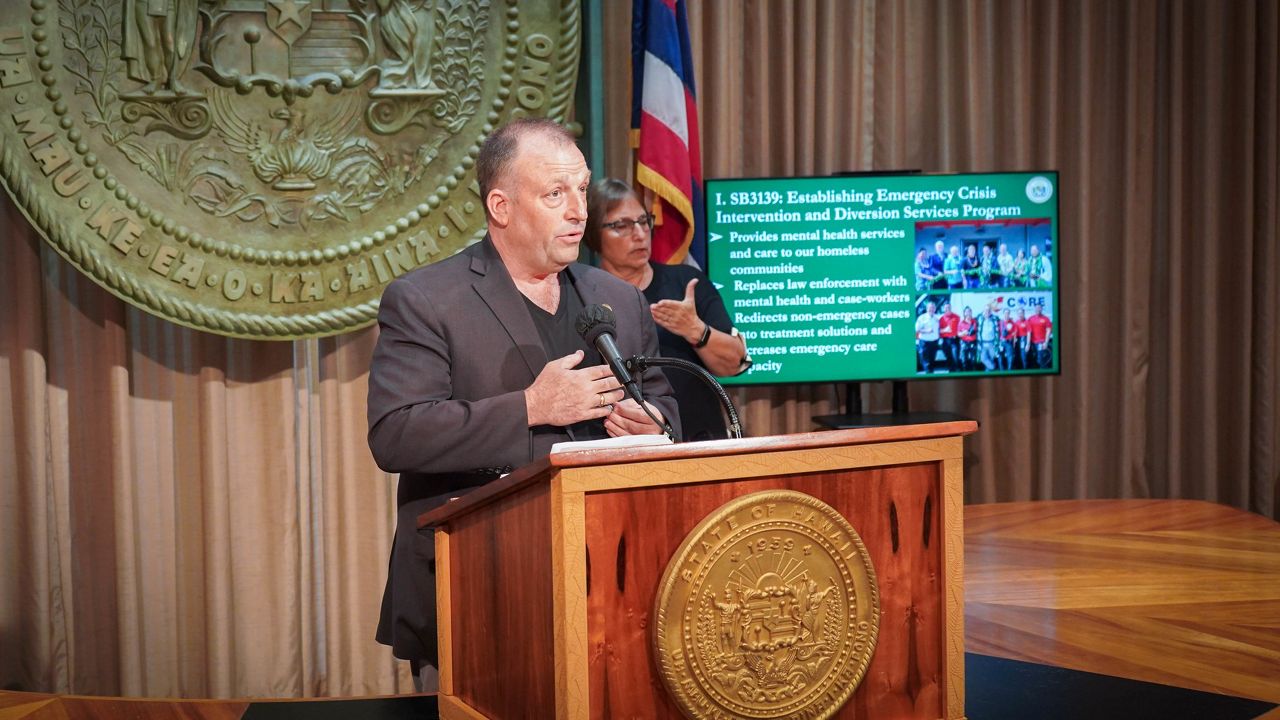In a flurry of enactments on Thursday, Gov. Josh Green signed into law 22 legislative measures relating to health care and community support systems, including bills aimed at steering individuals with mental health or substance abuse issues away from the criminal justice system, enhancing mental health care and support, establishing a peer support specialist working group and expanding health care employment retention efforts.
“Health care has evolved,” Green said. “Health care is not simply about having a doctor in the emergency department or admitting someone to a hospital. Health care is about the wellness of society, the wellbeing of people often on the streets. How do they get the care that they need? How do we actually find a way, in a civilized fashion, to care for those who don’t even have a chance to find their way back into a healthy state?”
Green said the state’s approach encompasses not just direct medical or behavioral health care but also factors like cost-of-living or access to insurance that affect individual and community health.
Among bills the governor highlighted during a Thursday news conference and signing ceremony was Senate Bill 3139, which creates a crisis intervention and diversion services program within the state Department of Health.
The measure expands existing services to divert individuals experiencing mental health disorders or combined mental health and substance abuse disorders toward appropriate health care services and away from the criminal justice system. It also clarifies when a law-enforcement officer may take control of a person experiencing such disorders and the procedures for calling for assistance from a mental health emergency worker and transporting the person to psychiatric facility or health crisis center if deemed necessary.
“Through this bill, we affirm our commitment to a more humane and effective approach to addressing mental health crises in our communities,” Green said. “By prioritizing access to crisis-intervention services, we can support individuals in need and foster healthier outcomes for everyone.”
Green also enacted House Bill 2159, which enhances support for individuals in need of assisted community support.
The bill requires the Department of the Attorney General to assist in preparing, filing and presenting petitions for ACT; establishes a mechanism for automatically screening of certain nonviolent defendants for involuntary hospitalization or ACT; allows courts to require that certain probation violators undergo a mental health evaluation and treatment program as a condition of continued probation; and allows a court to appoint an attorney for an individual petitioning for ACT if needed.
“By ensuring comprehensive support through assisted community treatment, we are prioritizing the wellbeing of individuals in crisis and reinforcing our commitment to compassionate care for all residents of Hawaii,” Green said.
Another bill signed on Thursday establishes a temporary working group within the Office of Wellness and Resilience to develop and make recommendations for a framework for peer support specialists in the state.
As the governor noted, SB 3094 is based on research that supports the effectiveness of peer support in mental and behavioral health and for those experiencing homelessness, substance abuse and involvement with child welfare or criminal justice systems.
Green called the establishment of the Office of Wellness and Resilience and the peer support specialist working group “visionary steps toward a healthier, more resilient, and more supportive Hawaii.”
“Peer support specialists play a vital role in fostering recovery and resilience, and this legislation will strengthen our state’s mental health infrastructure,” he said.
Green also highlighted HB 1827, which addresses staffing shortages across the health care industry in Hawaii.
The newly enacted measure appropriates funds to the Department of Labor and Industrial Relations and the Department of Education to support health care workforce development programs, specifically the public high school health care workforce certificate program and the Glidepath program for certified nurse aides. It also provides funding to renovate and equip certain high school classrooms for health care training.



